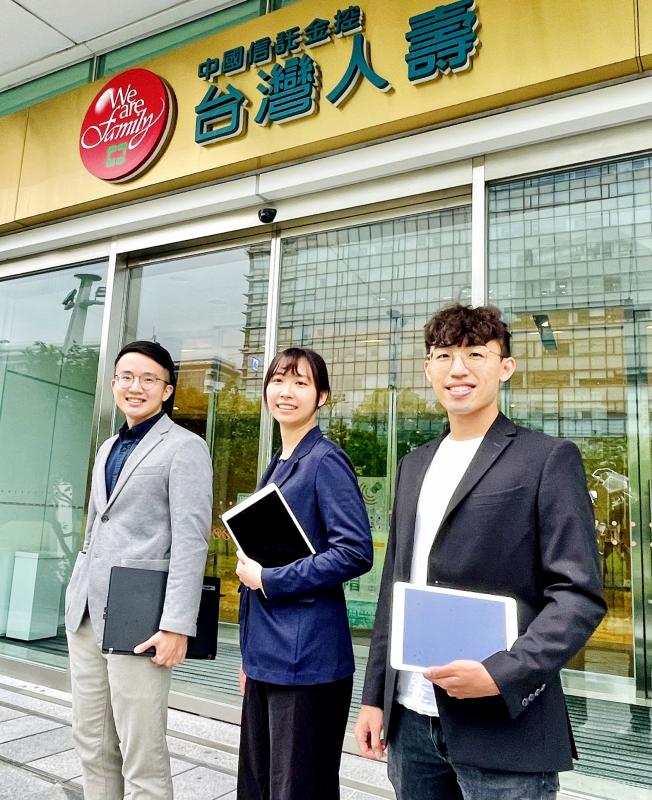Taiwan Life Insurance Co (台灣人壽) is considering injecting capital into its subsidiary CTBC Insurance Co (中國信託產險), as the unit has been paying out about NT$5 million (US$168,294) per day in compensation for COVID-19 claims, parent company CTBC Financial Holding Co (中信金控) told an investors’ conference in Taipei yesterday.
The amount of the injection has not been finalized, as the number of claims affecting CTBC Insurance’s financial strength would change as the government changes its disease prevention measures, such as the isolation rules, CTBC Financial spokeswoman Chiu Ya-ling (邱雅玲) said.
The cash injection would not reduce Taiwan Life’s capital adequacy too much, Chiu said.

Photo courtesy of Taiwan Life Insurance Co
Taiwan Life’s risk-based capital (RBC) ratio stands at 335 percent and is expected to remain above 300 percent even after injecting capital into CTBC Insurance, she said.
Having sold 400,000 COVID-19 insurance policies, CTBC Insurance said that it has assigned more staff to deal with claims as domestic COVID-19 infections climb.
CTBC Financial reported that net profit in the first quarter fell 17 percent year-on-year to NT$16.29 billion, with subsidiaries CTBC Bank (中國信託銀行), CTBC Securities Co Ltd (中信證券) and Taiwan Life Insurance all reporting annual declines in net profit.
CTBC Financial’s revenue fell 0.3 percent from a year earlier, as a 16 percent increase in annual net interest income was offset by declines of 3.7 percent in annual fee income and 51 percent in annual revenue from trading, derivatives and foreign exchange.
CTBC Bank is monitoring the effects of China’s lockdowns on its business there, after the bank wrote off a loan loss of US$28 million related to a US$40 million loan to Chinese RISE Education Cayman Ltd (瑞思教育), Chiu said, adding that the bank has tightened its criteria for lending to education companies in the Chinese market.
CTBC Bank’s net interest margin edged up to 1.47 percent at the end of March, from 1.43 percent a quarter earlier, but its fee income from wealth management shrank 18 percent to NT$4.18 billion, it said.
Taiwan Life’s first-year premiums fell 28 percent year-on-year to NT$22.4 billion, because the premiums from investment-linked policies plummeted 78 percent to NT$4.9 billion from NT$22.71 billion a year earlier amid volatility in global markets, company data showed.
Assets invested by Taiwan Life totaled NT$2.02 trillion, up 0.8 percent from a quarter earlier, while the insurer invested more in equities and domestic fixed income, and reduced its weighting of mutual funds and overseas fixed income, it said.

Vincent Wei led fellow Singaporean farmers around an empty Malaysian plot, laying out plans for a greenhouse and rows of leafy vegetables. What he pitched was not just space for crops, but a lifeline for growers struggling to make ends meet in a city-state with high prices and little vacant land. The future agriculture hub is part of a joint special economic zone launched last year by the two neighbors, expected to cost US$123 million and produce 10,000 tonnes of fresh produce annually. It is attracting Singaporean farmers with promises of cheaper land, labor and energy just over the border.

US actor Matthew McConaughey has filed recordings of his image and voice with US patent authorities to protect them from unauthorized usage by artificial intelligence (AI) platforms, a representative said earlier this week. Several video clips and audio recordings were registered by the commercial arm of the Just Keep Livin’ Foundation, a non-profit created by the Oscar-winning actor and his wife, Camila, according to the US Patent and Trademark Office database. Many artists are increasingly concerned about the uncontrolled use of their image via generative AI since the rollout of ChatGPT and other AI-powered tools. Several US states have adopted

KEEPING UP: The acquisition of a cleanroom in Taiwan would enable Micron to increase production in a market where demand continues to outpace supply, a Micron official said Micron Technology Inc has signed a letter of intent to buy a fabrication site in Taiwan from Powerchip Semiconductor Manufacturing Corp (力積電) for US$1.8 billion to expand its production of memory chips. Micron would take control of the P5 site in Miaoli County’s Tongluo Township (銅鑼) and plans to ramp up DRAM production in phases after the transaction closes in the second quarter, the company said in a statement on Saturday. The acquisition includes an existing 12 inch fab cleanroom of 27,871m2 and would further position Micron to address growing global demand for memory solutions, the company said. Micron expects the transaction to

A proposed billionaires’ tax in California has ignited a political uproar in Silicon Valley, with tech titans threatening to leave the state while California Governor Gavin Newsom of the Democratic Party maneuvers to defeat a levy that he fears would lead to an exodus of wealth. A technology mecca, California has more billionaires than any other US state — a few hundred, by some estimates. About half its personal income tax revenue, a financial backbone in the nearly US$350 billion budget, comes from the top 1 percent of earners. A large healthcare union is attempting to place a proposal before